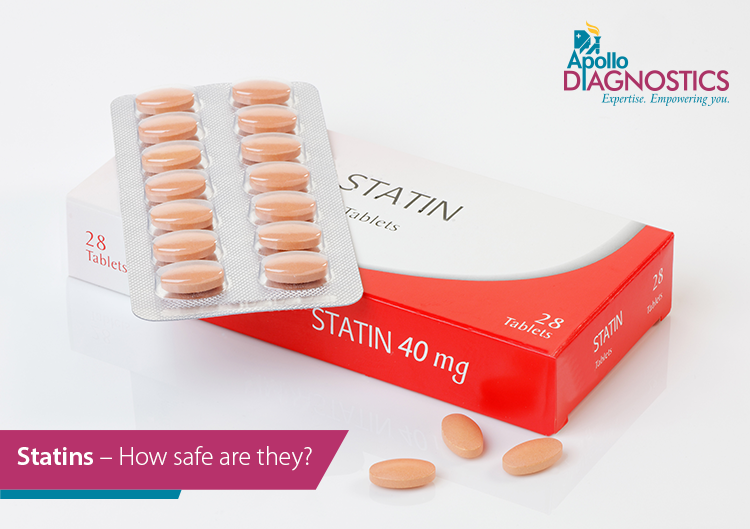Statins – How safe are they?
Jun 04, 2020

You must be familiar with the ill-effects that bad cholesterol (LDL or low-density lipoprotein) has on your general health. Although its relation to heart disorders is not well-established, it does have other proven harmful consequences such as interfering with brain function and formation of gallstones. There are certain medicines that can bring down cholesterol levels, and statins are one of them. They are commonly prescribed to lower harmful levels of LDL cholesterol.
Statins are prescribed for people who have had a heart attack or a stroke, or if they’re at a significant risk of developing cardiovascular disease. But as with any new drug, the early days of statins invited a lot of concern about the side-effects and risks of statins. Some of the most common side-effects are muscle aches and cramps, occurring in around 5 percent of statin users. Memory problems, increased blood sugar, and type 2 diabetes are also associated with statin use. In extreme, rare cases, serious side-effects such as rhabdomyolysis (a condition in which muscle cells become damaged) and liver damage may occur.
side-effects such as rhabdomyolysis (a condition in which muscle cells become damaged) and liver damage may occur.
 side-effects such as rhabdomyolysis (a condition in which muscle cells become damaged) and liver damage may occur.
side-effects such as rhabdomyolysis (a condition in which muscle cells become damaged) and liver damage may occur.Studies have also shown that the risks mentioned before are not very common and are influenced by other risk factors. For instance, pregnant or breastfeeding women should not take statins. Those with an active liver disease are also advised to stay away from these medicines. Additionally, statins cannot be taken along with certain medicines. Some dietary restrictions are also necessary; grapefruit, for example, interferes with enzymes that metabolise statins and may increase the amount of medication in the bloodstream. This leads to a spike in the side-effects associated with statins. The risk factor is increased if the person is an alcoholic, or has a kidney or liver disease. Thus, it is always recommended that you should take statins only with your doctor’s recommendation.
On the other hand, statins have been proved to be potentially life-saving medicine. The benefits far outweigh the side-effects, and reviews have concluded that statins are essentially effective and usually safe. Researchers say that statins can prevent a significant number of heart attacks and strokes. Contrary to fears surrounding statin use, among the people being studied, only those who knew that they were taking statins were likely to report the side-effect of muscle problems.
Thus, the final judgement towards which the medical community leans is that statins are safe and effective and that people who avoid it due to fear of risks are actually not making use of its heart attack prevention power. If you still wish to calm your apprehensions, do visit a renowned heart specialist to know more about how statins help in keeping the heart healthy. If your doctor prescribes a statin, you can undoubtedly use it for a healthy heart.
Related Blog Post
Blog Categories
- Child Health
- Mens Health
- Women's Health
- Mental Health
- Health Myths & Facts
- Fitness
- Nutrition/Recipes
- Remedies
- Weight Management
- Stress Management
- Health Supplements
- Addiction Management
- Disease Management
- Allergy
- Anemia
- Arthritis
- Asthma
- Autoimmune Diseases
- Blood Pressure
- Cancer
- Deficiencies
- Dengue/Malaria/Chikungunya
- Diabetes
- Eye Problems
- Heart Diseases
- Hepatitis
- HIV/AIDS/STD
- Hormonal Imbalance
- Infection/Flu/Viral
- Kidney
- Liver
- Menstrual Problems
- Pregnancy
- Skin & Hair Problems
- Stomach Ailments
- Thyroid
- Others
- Health Checkups
- Diagnostics/Pathology
- Lifestyle & Wellness
- Covid
- Medical Tests
- Cholesterol
- Health Tips
- Parent Care/Old Age
- Lungs
- Food Intolerance







